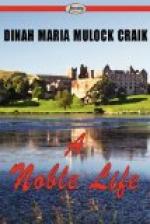“No wonder. Work must be a happy thing,” said, with a sigh, the young Earl of Cairnforth.
Helen’s heart smote her for having let the conversation drift into this direction, as it did occasionally when, from their long familiarity with him, they forgot how he must feel about many things, natural enough to them, but to him, unto whom the outer world, with all its duties, energies, enjoyments, could never be any thing but a name, full of sharpest pain. She said, after a few minutes watching of the grave, still face—not exactly sad, but only very still, very grave—
“Just look at papa, how happy he is among those books you sent for! Your plan of his arranging the library is the delight of his life.”
“Is it? I am so glad,” said the earl, brightening up at once. ’What a good thing I thought of it!”
“You always do think of every thing that is good and kind,” said Helen, softly.
“Thank you,” and the shadow passed away, as any trifling pleasure always had power to make it pass. Sometimes Helen speculated vaguely on what a grand sort of man the earl would have been had he been like other people —how cheerful, how active, how energetic and wise. But then one never knows how far circumstances create and unfold character. We often learn as much by what is withheld as by what is enjoyed.
“Helen,” he said, moving his chair a little nearer her—he had brought one good thing from London, a self-acting chair, in which he could wheel himself about easily, and liked doing it—“I wonder whether your father would have taken as much pleasure in his books thirty years ago. Do you think one could fill up one’s whole life with reading and study?”
“I can not say; I’m not clever myself, you know.”
“Oh, but you are—with a sort of practical cleverness. And so is Alick, in his own way. How happy Alick must be, going out into the world, with plenty to do all day long! How bright he looked this morning!”
“He sees only the sunny side of things, he is still no more than a boy.”
“Not exactly; he is a year older than I am.”
Helen hardly knew what to reply. She guessed so well the current of the earl’s thoughts, which were often her own too, as she watched his absent or weary looks, though he tried hard to keep his attention to what Mr. Cardross was reading or discussing. But the distance between twenty and sixty—the life beginning and the life advancing toward its close— was frequently apparent; also between an active, original mind, requiring humanity for its study, and one whose whole bent was among the dry bones of ancient learning—the difference, in short, between learning and knowledge—the mere student and the man who only uses study as a means to the perfecting of his whole nature, his complete existence as a human being.
All this Helen felt with her quick, feminine instinct, but she did not clearly understand it, and she could not reason about it at all. She only answered in a troubled sort of way that she thought every body, somehow or other, might in time find enough to do—to be happy in doing—and she was trying to put her meaning into more connected and intelligible form, when, greatly to her relief, Malcom entered the library.




